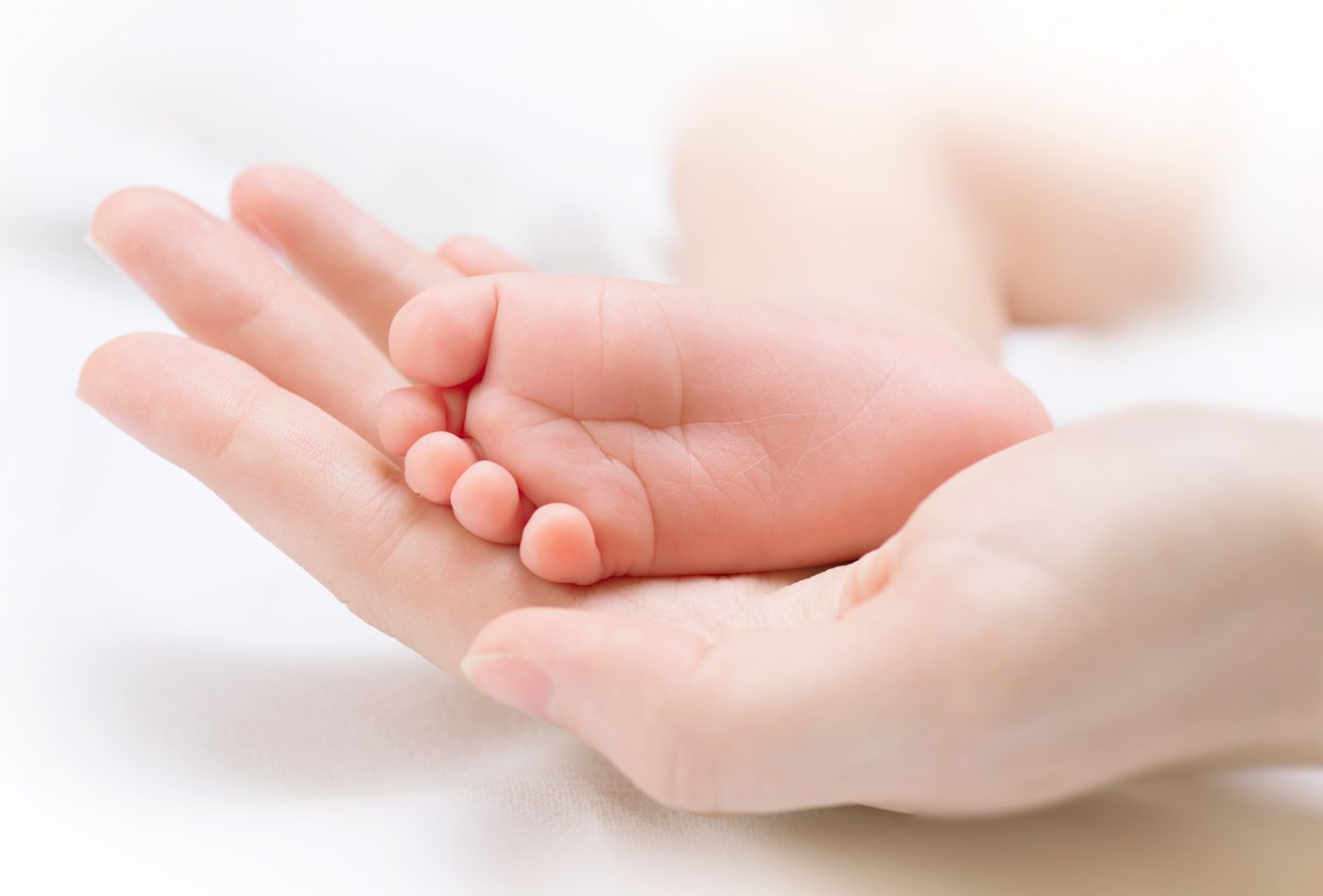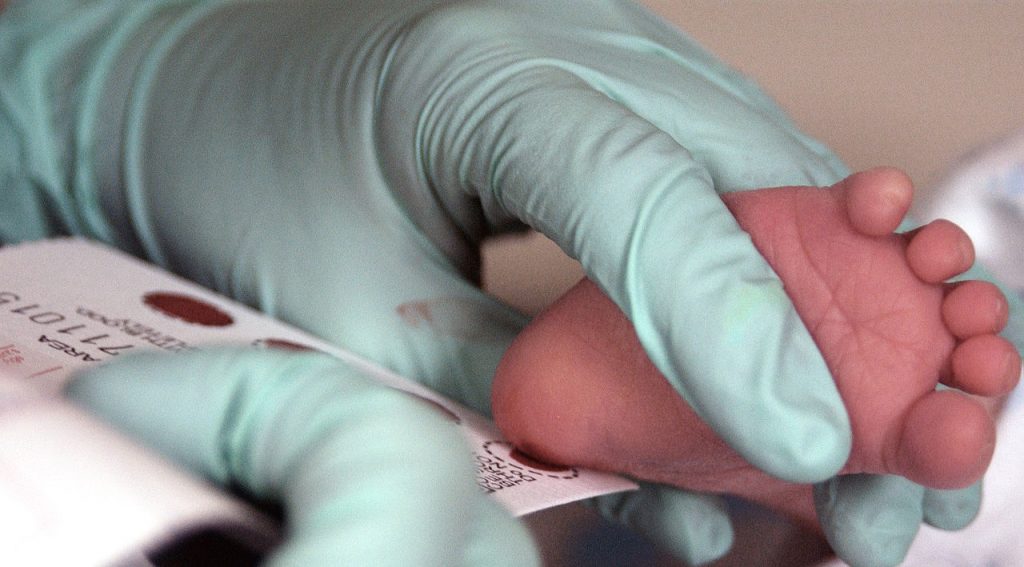
Newborn blood spot screens for the following rare conditions in newborn babies:
Sickle cell diseaseWhy are babies screened for such rare conditions?
Thankfully, most babies screened won’t have any of these conditions but, for the few babies who do early treatment is very important. It can improve their health, and prevent severe disability and even death.
What happens during the blood spot test?
When your newborn baby is five days old, a health professional will prick their heel using a special device. After the heel is pricked the health professional will collect four drops of blood on a special card.
You can minimise any distress and manage pain you will be able to feed your baby or cuddle them. Offering you baby a skin-to-skin breastfeed is particularly helpful in making sure your baby feels safe, warm and comforted.
Occasionally, the blood spot screening may need to be taken when your baby is six, seven or eight days old. In addition, a second blood spot sample is needed. The reason for this will be explained to you. It doesn’t necessarily mean there is something wrong with your baby.
The small wound stops bleeding quickly and the test doesn’t carry any known risks for your baby.
Which conditions does the blood spot screen for?
The blood spot test screens for the following nine rare but serious conditions. It is very important that you tell your antenatal team or health professional if you, your partner or a family member already has one of these conditions (or there is a family history of it). This will allow them to plan any additional scans needed e.g., an ultrasound scan of your baby’s thyroid gland during pregnancy.
Sickle cell disease
About 1 in 2,000 babies born in the UK has sickle cell disease. It is a serious inherited blood disease. Sickle cell disease affects haemoglobin, the iron-rich protein in red blood cells that carries oxygen around the body Babies who have this condition will need specialist care throughout their lives.
People with sickle cell disease can have attacks of severe pain and get serious, life-threatening infections. They are usually anaemic because their blood cells are ‘sickle’ shaped have difficulty carrying oxygen.
If sickle cell disease is diagnosed babies can immediately receive early treatment to help them live healthier lives. This may include vaccinations and antibiotics to prevent serious illnesses. Pregnant women are also routinely tested for sickle cell disease early in pregnancy.
Cystic fibrosis
About 1 in 2,500 babies born in the UK has cystic fibrosis. This inherited condition affects the digestion and lungs. Babies with cystic fibrosis may not gain weight well and frequently have chest infections.
Babies with cystic fibrosis can be treated early with a high-energy diet, medicines, physiotherapy and lung transplants. Although children with cystic fibrosis may still become very ill, early treatment can help them to live longer, healthier lives.
Congenital hypothyroidism
About 1 in 3,000 babies born in the UK has congenital hypothyroidism. Babies with congenital hypothyroidism do not produce enough of the hormone thyroxine from their thyroid gland.
If your baby was premature and born before 32 weeks, an additional test will be needed for congenital hypothyroidism when she is 28 days of age or when she is discharged from the hospital, whichever is sooner.
Without thyroxine, babies do not grow properly and can develop learning disabilities. The good news is that individuals with hypothyroidism can take thyroxine tablets to completely replace any missing hormone. Babies treated early with thyroxine tablets will have no long-term problems and can develop normally.
Inherited metabolic diseases
It is important to let your antenatal team and health professionals know if you or your partner have a family history of a metabolic disease (a disease that affects your metabolism).
Babies are currently screened for six inherited metabolic diseases. These are:
• phenylketonuria (PKU)
• medium-chain acyl-CoA dehydrogenase deficiency (MCADD)
• maple syrup urine disease (MSUD)
• isovaleric acidaemia (IVA)
• glutaric aciduria type 1 (GA1)
• homocystinuria (pyridoxine unresponsive) (HCU)
About 1 in 10,000 babies born in the UK has phenylketonuria PKU or medium-chain acyl-CoA dehydrogenase deficiency MCADD. The other conditions are much rarer, occurring in only 1 in 100,000 to 150,000 babies.
Sadly, without early treatment, babies with inherited metabolic diseases can become suddenly and seriously ill. Each disease is different with its own symptoms. Depending on which one affects your baby, the condition may be life-threatening or cause severe developmental problems. The good news is that they can all be treated and managed with a carefully managed diet and, in some cases, medicines as well.
Occasionally, other medical conditions are picked up by the newborn blood spot test screening. For example, babies with beta thalassaemia major (a serious blood disease) will usually be detected. These babies will be referred for early treatment too.
What is a metabolic disease?
Babies with an inherited metabolic diseases are unable to break down one or more amino acids. When levels of these amino acids get very high inside the body, they are harmful.
Amino acids are the building blocks of the proteins in our food. When we digest our food we convert protein into amino acids which we use in cell growth and metabolism. Waste amino acids that aren’t needed are usually broken down and removed from the body.
I have been told my baby is a carrier. What does this mean for my baby and my family?
Carrier status is very common and doesn’t mean your baby will become ill.
What are the health implications for my baby?
Your baby should still be healthy and not develop the disease.
Further tests are sometimes needed to confirm cystic fibrosis carrier status. You can arrange these through your GP.
What are the health implications for my family?
A baby may be a carrier because one of the parents is. This is quite common and shouldn’t affect their health.
More rarely, a baby may be a carrier because both their parents are, but they have inherited the gene from only one parent.
If both parents are carriers, there is a one in four chance (25% ) that a future brother or sister with the same parents may inherit two altered genes (from each parent) and have an inherited disease.
Currently, women are offered testing for sickle cell disease in pregnancy, so new mothers should already know if they are carriers. If you are a carrier a genetic counsellor can be provided to explain this in more detail and arrange tests for you if you’re concerned.
In some areas of England, screening for a condition called severe combined immunodeficiency (SCID) is also being offered as part of the newborn blood spot test. This is to help the NHS decide if screening for SCID should be offered to all babies in England.
SCID causes problems with the immune system. It makes it very hard for a baby to fight off infections like meningitis and pneumonia, which can be life-threatening. About 14 babies born each year in England have SCID.
Ask your midwife if screening for SCID is being offered in your area.
Does my baby have to have the blood spot test?
The newborn blood spot test is strongly recommended in the UK because it could save your baby’s life. However, it is not compulsory. You can choose for your baby to have separate screening for sickle cell disease, cystic fibrosis or congenital hypothyroidism. However, you can only choose for your baby to be screened for either all six inherited metabolic diseases or none at all. If you have any concerns about the newborn blood spot test or screening your baby for these treatable conditions, discuss it with your antenatal team. You should be given information about the blood spot test and the diseases it screens for before your baby is born so you can understand the test and make an informed decision for your baby.

By U.S. Air Force photo/Staff Sgt Eric T. Sheler (USAF Photographic Archives)
Can I change my mind if my baby didn’t have the newborn screening bloodspot test?
If you change your mind, babies can be screened up to the age of 12 months for all the conditions except cystic fibrosis. Cystic fibrosis can only be screened for up to eight weeks of age.
When will we get my baby’s results?
You should receive the results either by letter or from your baby’s health professional when your baby is around 6-8 weeks old.
The results should be recorded in your baby’s personal child health record (red book). It’s important to keep this safe and take it with you to all your baby’s appointments. If you move to a new area with your newborn baby you will need a record that she has had her newborn bloodspot test.
If you have not received your baby’s results, speak to your health visitor or GP.
Will I be contacted if any results are positive?
You will be contacted quickly if your baby screens positive. This means they’re more likely to have one of the conditions tested for:
If your baby has a positive test for congenital hypothyroidism (CHT) or a metabolic disease, you will be contacted the day the result is available, or the next working day, and referred to see a specialist.
If your baby has a positive test for cystic fibrosis, you will be contacted before they are one month old.
If your baby has a positive test for sickle cell disease, you will be contacted before your baby is 6 weeks old.
Support and information after a positive result
The NHS has produced leaflets for parents who have been told their baby may have one of the conditions screened for. Each leaflet provides information about the condition, further tests that may be offered and what treatment is needed. They also answer parents’ frequently asked questions, including where to find support.
Is the test ever wrong?
It’s important to know that screening is not 100% certain. A baby with a negative screening result may later turn out to have the disease screened for. This is known as a false negative. Babies with a positive result sometimes turn out not to have the disease – what’s known as a false positive.
What information is recorded on newborn blood spot cards?
As well as being used to take blood samples, the cards record personal information, including;
• baby’s name
• date of birth
• address
• NHS number
• mother’s name
• contact details of the GP and midwife.
These details are needed to make sure the results of the screening tests are matched to the right baby.
What happens to my baby’s blood spot card?
Blood spot cards are stored for at least five years. The cards may be used:
• to double-check your baby’s screening result
• to carry out other tests recommended by your doctor
• to investigate genetic diseases that run in your family
• to improve the national newborn-screening programme
• for research purposes to help improve the health of other babies and their families in UK. This research will not identify your baby, and the use of these blood spots is covered by a code of practice, which is available from your midwife.
There is a small chance researchers may want to include you or your child to take part in research linked to the newborn bloodspot screening programme. If you do not want to be invited, please let your midwife know.
If you or your baby has sickle cell disease or thalassaemia, information will be passed to the National Congenital Anomaly and Rare Diseases Registration Service (NCARDRS). This helps to improve screening and prevention or treatment of the condition.
You can opt out of the register, or find out more, by visiting the National Congenital Anomaly and Rare Disease Registration Service
Updated April 2022